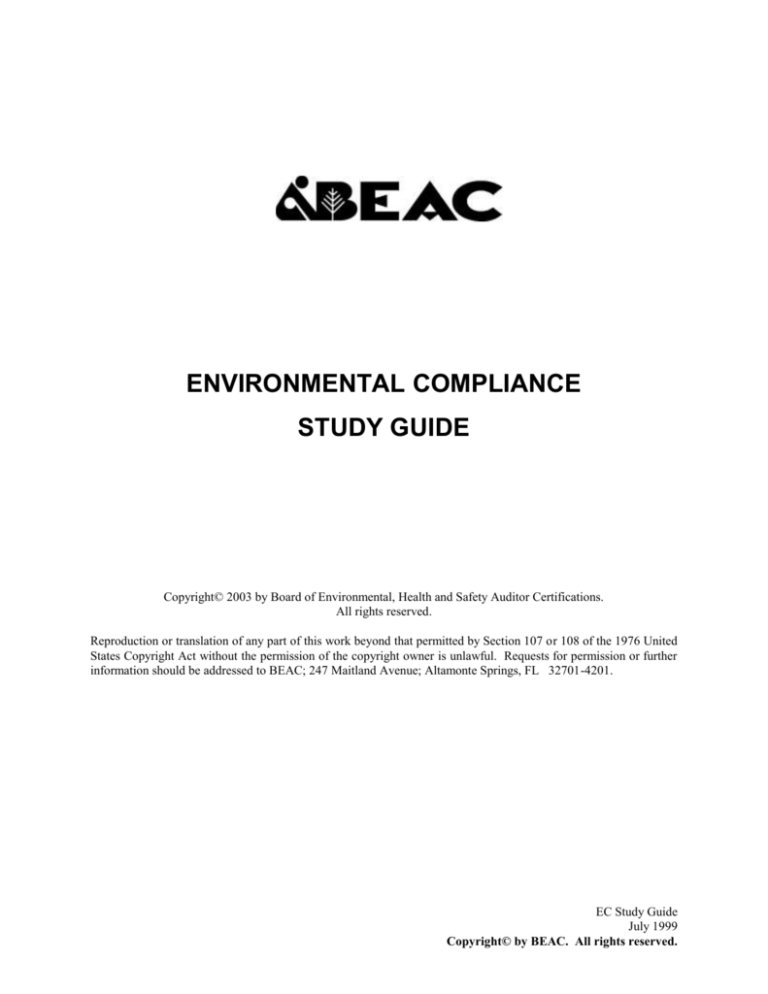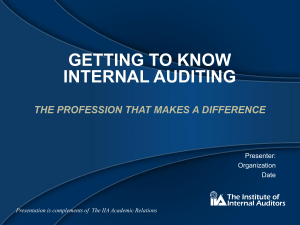
ENVIRONMENTAL COMPLIANCE
STUDY GUIDE
Copyright© 2003 by Board of Environmental, Health and Safety Auditor Certifications.
All rights reserved.
Reproduction or translation of any part of this work beyond that permitted by Section 107 or 108 of the 1976 United
States Copyright Act without the permission of the copyright owner is unlawful. Requests for permission or further
information should be addressed to BEAC; 247 Maitland Avenue; Altamonte Springs, FL 32701-4201.
EC Study Guide
July 1999
Copyright© by BEAC. All rights reserved.
Study Guide
Environmental Compliance CPEA Examination
This study guide is intended to assist an applicant in preparing for the BEAC Environmental
Compliance CPEA Examination and is composed of three parts:
I.
Exam Topics Outline - lists the topics and subject areas covered by the
exam;
II.
Reference List - contains the books and other documents that BEAC believes
are generally accepted sources which may be useful to the test taker and from which some of
the questions were derived,
III. List of sample multiple choice questions - similar to actual questions on
the exam (the exam also contains five short essay questions for which no examples are
included).
Candidates are given 6 hours to complete the examination.
Developed by the BEAC Examination Committee - July 12, 1999
EC Study Guide
July 1999
Copyright© by BEAC. All rights reserved.
Exam Topics Outline – Environmental Compliance Examination
1.
Ethics and Standards of Conduct for Auditors
This category relates to the candidate's understanding, judgment and perception of how an
auditor should behave and react to ethical situations that can occur in the audit process. Test
questions could focus on topics such as:
Conflict of Interest
Independence of Auditors
Due Professional Care
Material Facts and Disclosure
Auditor Proficiency
2. Audit Program Design and Planning
This category includes issues related to the design, structure and key planning elements of
environmental audit programs. Test questions could focus on topics such as:
•
Senior Management Commitment
•
Scope of Audit Programs
•
Audit Tools
•
Site Selection/Frequency of Audits
•
Quality Assurance Mechanisms
•
Auditor Staffing/Training
•
Legal Protection/Confidentiality of Results
3. Pre-Audit Activities
This category relates to activities associated with preparing to conduct an environmental audit.
This is different from Category 2 above which focuses on audit program planning issues. Test
questions could focus on topics such as:
•
Pre-Visit Questionnaire
•
Regulatory Information Review
•
Pre-Visit Facility Contact
•
Preparation of Audit Plan
•
Pre-Audit Team Coordination
•
Selection of Audit Criteria
4. On-Site Audit Activities
This category relates to the activities auditors typically conduct once on-site to verify
compliance with regulatory requirements. Test questions could focus on topics such as:
Opening Meeting
Orientation Tour of Facility
Records/Document Review
Interviewing
Visual Inspection
Closing Meeting
Handling Sensitive Situations
Use of Working Papers
EC Study Guide
July 1999
Copyright© by BEAC. All rights reserved.
5. Post-Audit Activities
This category relates to those activities that occur after the on-site verification activities are
concluded and the auditors leave the facility. Test questions could focus on topics such as:
Writing Audit Findings & Recommendations
Corrective Action Procedures
Follow-Up/Close-Out of Findings
6. Internal Controls
This category relates to an auditor's need to understand the systems and procedures that exist
at the audited facility to ensure compliance with regulatory criteria. Test questions could focus
on topics such as:
Identification of Applicable Compliance Areas
Responsibility/Accountability for Compliance Task/Functions
Training/Qualifications of Facility Staff
Availability of Compliance Procedures
Quality Assurance Mechanisms for Compliance
7. Legislative/Regulatory Applicability
This category relates to an auditor's need to understand what environmental laws and
regulations apply to a particular process or operation at audited facilities. Test questions could
focus on topics such as:
Major Regulatory Thrust of Nine Major Environmental Laws
EPA/State Jurisdiction/Enforcement of Laws
Regulatory Process (interim, draft, final)
Ability to Determine Applicability of Environmental Laws to Audited Facility
Operations/Processes
8.
Process Operations Environmental Impacts and Related Pollution Control
Technologies
This category relates to an auditor's ability to evaluate what environmental impacts and
compliance issues result from typical process operations and understanding the generic
pollution control technologies to control the impacts. Test questions could focus on topics such
as:
Typical Waste Steams and Pollutants Generated by Process Operations
Thresholds that Trigger Compliance Requirements
General Concepts of Operation of Pollution Control Technologies
Typical Compliance Related Requirements Associated with Pollution Control
Technologies
9. Media Specific Regulatory Knowledge
This category relates to an auditor's knowledge of key regulatory requirements that are typically
evaluated during an audit. Test questions could focus on topics such as:
Wastewater/Stormwater
Air Emissions
Hazardous Waste/Solid Waste
SARA Title III
UST's
Drinking Water
Spill Control/Response (SPCC)
TSCA (PCB's)
EC Study Guide
July 1999
Copyright© by BEAC. All rights reserved.
Reference List *
A Common Body of Knowledge for the Practice of Internal Auditing – Institute of Internal
Auditors
Environmental Auditing - L. Cahill and R. Kane
Environmental Auditing - Fundamentals and Techniques - J. Ladd Greeno, et al
Practical Guide to Environmental Management - F. B. Fiedman
Sawyers Internal Auditing - L. B. Sawyer
Corporate Environmental Strategy - B. Piasecki
Environmental Risk Management - E. Rothenberg
Environmental, Health and Safety Auditors Handbook - J. Ladd Greeno, et al
EPA Audit Policy - 1986
EAR Standards (Parts 1&2) - Environmental Auditing Roundtable
Auditing for Environmental Quality Leadership - J. Willig/Environmental Auditing Roundtable
Effective Environmental Auditing - International Chamber of Commerce
Achieving Environmental Management Standards - M. J. Gilbert
Standards for the Professional Practice of Internal Auditing – Institute of Internal Auditors
EAR and BEAC Codes of Conduct
* This reference list is given as suggestions for supplemental reading only. BEAC does not endorse any
particular reference.
EC Study Guide
July 1999
Copyright© by BEAC. All rights reserved.
Sample Questions
1.
Which of the following activities would not be typically performed during the on-site portion
of a compliance audit?
a. participate in an orientation tour
b. interview personnel
c. obtain federal and state regulations
d. facilitate a closing conference
e. none of the above
2.
Which of the following is not one of the national ambient air quality standard pollutants?
a. nitrogen trioxide
b. sulfur dioxide
c. carbon monoxide
d. lead
e. all of the above
3.
A generator of a land disposal restricted hazardous waste may conclude that his/her waste
stream requires no further treatment. If so, paperwork that this generator is obliged to
include with shipments of the waste must include:
a. EPA hazardous waste number
b. applicable treatment standard
c. manifest number of the waste shipment
d. waste analysis data, if available
e. all of the above
4.
Which of the following is least applicable to the conduct of audits according to EAR
standards?
a. written plans and procedures
b. use of protocols and checklists
c. field inspections based on experience
d. sampling techniques for data gathering
e. documentation and evidence of findings
5.
The senior management of ABC Co. requested an audit of the XYZ plant to determine
compliance with the Clean Air Act provisions requiring continuous emissions monitoring of
boiler emissions. A number of regulatory deficiencies were identified including the failure to
update and keep current the plant's required emissions monitoring plan. During a briefing,
the plant manager said that the monitoring plan was scheduled to be updated in the
following month and that accordingly the audit report should not contain this finding. As
lead auditor you should:
a. politely refuse the request as you are required to report all material facts
b. grant the request as a courtesy as the problem will soon be corrected
c. grant the request as the deficiency was not material in that it did not directly
contribute to emissions
d. do nothing at the time but conduct a follow-up ;Investigation in two months
e. refer the request to the Vice President of Operations
EC Study Guide
July 1999
Copyright© by BEAC. All rights reserved.
Answers for Sample Questions:
1.
C
2.
A
3.
E
4.
C
5.
A
EC Study Guide
July 1999
Copyright© by BEAC. All rights reserved.











